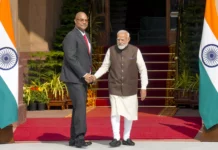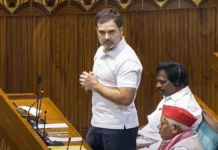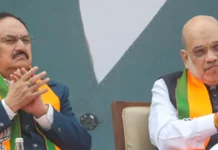 SHAMLI (UP): Rahul Gandhi came face to face with the bitter reality of the deep chasm between communities after the communal riots in the sugar belt of Muzaffarnagar and Shamli as he made an unannounced visit to the relief camps and villages in the twin districts on Sunday.
SHAMLI (UP): Rahul Gandhi came face to face with the bitter reality of the deep chasm between communities after the communal riots in the sugar belt of Muzaffarnagar and Shamli as he made an unannounced visit to the relief camps and villages in the twin districts on Sunday.
While the intent to stay together is there, the mistrust among communities runs high noting which Gandhi talked about the need for “mediation”. He also stressed on the urgency to improve the “very bad conditions” in the camps.
Gandhi made a fervent appeal to the riot victims to return home cautioning them that communal forces want to keep them separate but, scores of Muslim victims in camps at Malakpur, Bharnau, Barnali and Madarsa Dabhedi Khurd said a resounding “no” fearing violence back home.
At Malakpur camp, where Gandhi’s cavalcade reached criss-crossing the village road via Bapouli, Sanouli Khurd and Kairana via the dilapidated Kairana bypass road in an apparent bid to keep the visit secret, the camp dwellers complained that 23 children have died here due to cold in absence of warm clothes.
Complaints were similar at most of camps located on both sides of the village road dotted with sugarcane farms.
“We will not go back. They are powerful,” a youth said bitterly at Khurgan prompting Gandhi to ask “How many dabang (muslcemen) are there?”
Mufti Aslam at Malakpur was, however, agitated that the state administration wanted a pledge from the camp-dwellers that they would not go back to their villages if they have received a compensation of Rs five lakh earmarked for the rehabilitation of the displaced.
As Gandhi repeatedly asked him what should be done so that the victims could return to their homes, he insisted that it is not possible unless those who carried out the riots and “are still moving scot free” are put behind bars.
At Baranali a woman screamed, “I have lost my son and they have also burnt my house. What will I do by going there?”
At Bharnau camp, the riot victims tried to block Gandhi’s cavalcade seeking solutions to their problems and clear assurances.
Some community organizations have also pitched in for help. A banner of Taiyab Hospital was seen at the relief camp in Akbar Sunethi.
The representatives of the victims handed over a copy of the state government order as well a memoranda of demands, the community members had submitted to Uttar Pradesh Chief Minister Akhilesh Yadav in which they said the riot victims from the community were mostly farm workers or those who worked at brick kilns, who have lost their livelihood now.
The list of demands by All India Ittehadul Musalmeen of Kairana submitted to Chief Minister Akhilesh Yadav had as the first demand that “staffs and officers of police belonging to Jaat community in Shamli, Muzaffarnagar and Baghpat districts should be transferred to other districts.”
There was also a complaint in hush hush tone that few people have their vested interests in running the camps as they stand to benefit from the monetary help coming for the community from various quarters.
Shamli District Congress President Ayub Jung alleged that it is mostly members of Samajwadi Party, which are running the camps and they do not want the camp-dwellers to return home.
However such allegations apart, it seems the riots have created an atmosphere of mistrust and led to wounds that could take time to heal. Gandhi told the Jaat villagers in Kankda that they stand to lose from the communal divide and leaders will come and go.
The riot survivors had some time ago taken to streets in Muzaffarnagar protesting alleged attempts by the state government to pressurize them into declaring they will not return to their villages and give up claims over their properties in return for Rs 5 lakh compensation.
The worst-ever riots in Uttar Pradesh in decades killed more than 60 people and rendered thousands homeless forcing them to live in camps in terrible conditions with little means of sustenance. However in Jaat dominated Kankda, villagers complained to Gandhi that while the Muslim riot victims are being given compensation by the state, nothing has come to people from their community. Three persons from the village were killed in the communal clashes while 40 were injured, five seriously.
As Gandhi asked whether all the injured people are fine now, villagers said, “No injured was given any monetary assistance here.”
They alleged that the state administration was acting under pressure and action was not taken against members of a particular community, who first resorted to violence.
Villager Juglal says “earlier riots never took place there.”
When villagers complained about unequal treatment by the state government, Gandhi as well as other Congress leaders accompanying him reminded them that their hands are tied as the state government here is of another party.
Gandhi’s cavalcade was stopped at Sanjhak, where a camp was pitched for riot victims behind Islamia Madarsa. Scores of women and children surrounded him seeking better facilities.
Uttar Pradesh Secretary D S Sharma had on October 26 written to the Commissioner of Saharanpur division that a rehabilitation proposal (Rs 5 lakh) has been made available for “Muslim families” living in camps after being displaced and those who “will not be able to return to their villages, homes under any circumstances”.
As the letter kicked up a controversy, Sharma in another order on November 25 said the earlier order stands revised replacing the term “displaced Muslim family” with “displaced family” thereby making it religion neutral.
The order was modified after the Supreme Court asked the government to withdraw the controversial notification.
The amended notification also said, “If any family returns voluntarily to his home/village to settle there, the family will return the money (Rs 5 lakh). Otherwise the amount will be realized from them like land revenue.”
Raising the issue before Gandhi, representatives of riot victims in Malakpur camp resented that this means those who receive the money to settle somewhere will now have to leave their properties back home for ever, which could be much more pricey.–PTI






